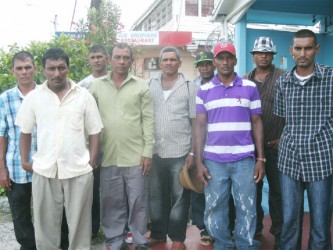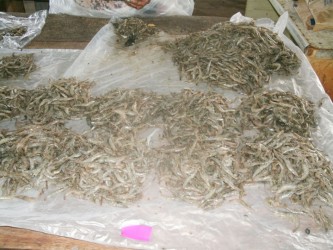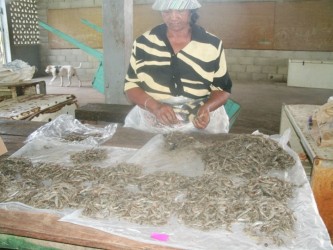Corentyne fisher folk are calling for the authorities to intervene and for mechanisms to be put in place to stem the influx of shrimp smuggled from Suriname being sold on the local market.
The approximately two dozen fishermen who raise and harvest “black shrimp” in ponds at Fyrish, Corentyne, say they cannot compete with the shrimp smugglers who bring hundreds of buckets of shrimps into the country every day, threatening their livelihood.

“We are a group of small fish farmers along the Corentyne coast, and we are encountering a serious problem in terms of the Suriname shrimps that is coming across the border and affecting us…especially the market,” said Seudat Persaud, a vendor of the Rose Hall Market.
“We produce like half and quarter buckets each per day, and they bring like a hundred buckets every day, so when they flood the market the price goes down so we suffer,” Persaud said, adding that this has been his livelihood for 42 years.
According to Persaud, when the Berbice Anti Smuggling Squad (BASS) was functional, the issue was kept under control. “But now it’s like BASS not functioning, and too much shrimps coming into the country illegally and we are being hindered from adequately maintaining our families,” he said.
The man said the shrimp is smuggled from Suriname in large quantities, swamping the markets and causing its value to drop. This forces local fisher folk to sell their shrimp at very low prices—sometimes $6,000 per bucket—just to get the product off their hands. Meanwhile, the smugglers wholesale their shrimps at $8,000 and $9,000 per bucket.

Compounding an already vexing issue is the fact that the smuggled shrimps sometimes become contaminated during the journey from Suriname and is still sold, resulting in local fishermen becoming stigmatised.
“It is very difficult for us and then the shrimps is sometimes contaminated because of the time it takes to bring it from Suriname to Guyana and when consumers buy it—especially those buying it to ship overseas, the retailers fool them that this is Guyana shrimps when in fact its Suriname shrimps. So we get a bad reputation with our shrimps, saying we selling bad product,” a frustrated Persaud said.
The man told this newspaper that he had informed the Region Six Fisheries Office about these practices and was redirected to another department which claims to have no authority to intervene in the matter.
“We are calling on the government authorities to take some action very quickly. I talk to the Fisheries Officer of Region Six and he said his department can’t do anything much and I should talk to the public health people. It is illegal. They are coming backtrack, so somebody must be able to do something about it!” he exclaimed.
Another fisherman, Chetram Samaroo, who said he had been fishing for the past 20 years opined that “the shrimps what we catch is enough for Guyana.”

“Our shrimps not selling. We don’t know what to do with it. We spend a lot of money on fish pond digging and paying people to help haul it in and we ain’t seeing any profit. Somebody got to look into our matter,” he said.
Fisherman Dennis Baker said, “This is a serious problem….this is not the first time it happening. But now there is too many persons smuggling the shrimps into the country. We just can’t cope with that. We spend a lot of money to invest in this business, only to have illegal activities screw it up.”
Another fisherman, Shamkumar Samaroo, is worried about how he will provide for his family if the situation persists. “We shrimps not selling and we are forced to take it back home and dry it. We suffering…we have families to maintain, children to go to school and we not getting the market to sell our shrimps,” he said.




